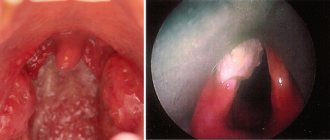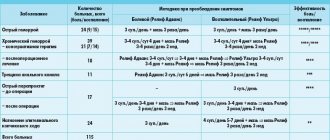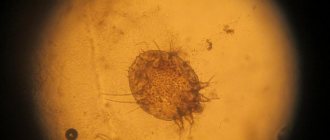Worms are considered one of the most common types of parasitic worms that infect humans. Characterized by a wide variety of species and forms, helminths can provoke the development of many serious diseases.
A helminthic infestation is quite easy to detect due to the huge number of external manifestations of infection. On the other hand, the majority of symptoms caused by helminths are not specific, which, along with the high number of parasites in the body, can greatly complicate making a specific diagnosis. As a rule, the final differentiation of the disease occurs only based on the results of a special laboratory study. What are the signs of helminthic infestation in adults?
About roundworm infection
Roundworms cause a whole group of diseases.
Nematodes are a whole group of specific diseases caused by the same pathogen - roundworms.
Symptoms of such ailments can be very different, depending on the type of parasite that has entered the body. In general, all nematodes can be divided into two large categories:
- acute, characterized by a clear manifestation of symptoms from the very first days of the development of the disease;
- chronic, sluggish and passing, as a rule, almost asymptomatic.
Ways of helminths entering the body
There are several of them, but the most common ways are four:
- From person or animal to person. This is how, for example, pinworm infection occurs. If a person infected with this type of worms touches various objects without washing their hands, then this will become a risk factor for others (it is not without reason that enterobiasis - and this is what pinworm infection is called - is an occupational disease of teachers, because pinworms are a real scourge of primary schoolchildren) .
- Through the soil. Worm eggs enter it along with human and animal feces, after which they are carried by water, insects, pets or wind (with dust particles) and end up on food or directly into the digestive tract or respiratory tract.
- When eating food that has not been subjected to heat treatment. Raw or half-raw meat or fish infected with worms are very dangerous. Therefore, you should very carefully choose restaurants that serve sushi.
- For insect bites. This happens quite rarely, but the risk of contracting helminthiasis through a bite increases when traveling to exotic countries.
Roundworms
The most common causative agent of nematodes in humans is roundworm. Typically, the first signs of infection with this worm appear in the second week, when the larvae of the parasite begin the migratory phase.
Most patients suffering from one type or another of ascariasis exhibit the same characteristic symptoms of this condition. Thus, with helminthic infestation of the lungs, patients usually complain of:
- temperature increase;
- paroxysmal asthmatic cough accompanied by chest pain;
- discharge from the lungs of a small amount of mucous sputum (sometimes streaked with blood).
Due to the ambiguity of symptoms, the described type of ascariasis is often confused with allergies, bronchitis, ARVI, asthma or even pneumonia. This kind of invasion is generally the last thing to be suspected, since the adult parasite does not take root in human lungs.
In other words, such a condition can arise only during the period of migration of roundworm larvae. As a result, only an x-ray showing a large number of infiltrates (that is, accumulations of eosinophils reacting to helminth toxins) in the patient’s lungs usually helps to establish an accurate diagnosis. With helminthic infestation of the intestines, the symptoms of the disease become more specific:
Worms in children
Children become infected with worms more often than adults. Small children tend to put everything in their mouth. While walking, children play on the ground and in the sandbox. They can hug and kiss strangers and stray animals. They don't care about dirty hands.
Therefore, it is so important to try to instill hygiene skills in children as early as possible. Young children should be supervised during walks, always having water and disinfectants ready to wash their hands and wipe their faces in time. And at the first signs of helminthic infestation, you should consult a doctor.
In Moscow, the most frequently detected helminth infections are enterobiasis and ascariasis.
Pinworms
Pinworms - cause severe swelling in the anus.
In general, pinworm infection is characterized by the same specific symptoms as ascariasis. In addition, the patient may feel severe itching in the anus, noticeably increasing in the evening and at night.
The nervous system suffers especially greatly with this type of helminthic infestation: the patient becomes restless and irritable; suffers from sleep disorders.
Typically, all the described symptoms begin to appear at the moment when the parasite that has settled in the body fully matures and begins the active process of reproduction and laying eggs.
Young children are most often infected with pinworms. The disease caused by these parasites, enterobiasis, in some cases can manifest itself in the form of urinary incontinence or suspicious heavy vaginal discharge (in women) or a rash similar to hives that occurs in the genital area (in both sexes). This is due to the fact that, in attempts to lay eggs in the perianal area, worms can penetrate the urethra.
It is curious that pinworms never begin to reproduce directly in the intestines. That is why the fact of infection with these helminths is so difficult to establish using a standard stool analysis, while eggs or even adult individuals of other parasites can often be seen in the stool with the naked eye.
Causes of helminthiasis
How does worm infection occur?
Adults inside humans lay a huge number of eggs (hundreds and thousands per day). Worm eggs are excreted from the human body along with feces. In order for a new host to become infected, it is necessary for the helminth eggs to enter his intestines. In most cases, this occurs along with food intake, for example, when eating with unwashed hands or when eating unwashed vegetables and fruits. Some types of helminthic infestations are geohelminthiases. In this case, the eggs of the parasite must first mature by being in the soil for some time (such as roundworms). Other types of worms are used for the maturation of intermediate “hosts” - animals. These are tapeworms - the most famous of the flat parasitic worms - bovine and pork. Their larvae mature in the muscles of animals and enter the human body along with meat that has not undergone proper heat treatment, and already inside a person they turn into an adult.
The opposite situation is also possible, when the human body is used by the helminth as an incubator for the larvae. The final host of such parasites is a predator. The predator is expected to catch the prey and eat the meat infected with the larvae. In this regard, a person is a dead end - a larva that gets into it will no longer turn into an adult, but the larvae
predator worms can cause us a lot of harm. In the human environment, two typical predatory animals are a dog and a cat. They can become a source of infection. The eggs of worms from these animals enter the human intestine, where they hatch into larvae, which can then migrate throughout the body. The liver is most often affected. To prevent infection from pets, you should not kiss them, and a dog that can become infected with helminths while running along the street must be subjected to regular treatment for worms.
Also, worm eggs can enter our body through inhalation of dust or with a sip of water when swimming in a pond. Flies carry worm eggs.
Trichinella
Trichinella disrupts heart rhythm.
Trichinosis, or infection of the body with roundworms - Trichinella, usually occurs in three phases:
- an asymptomatic incubation period, which usually lasts no more than one and a half months;
- phase of disease development, accompanied by characteristic clinical symptoms (fever, chills, general weakness, muscle pain and swelling);
- peak of the disease, characterized by persistent fever, myalgia of the muscles of the neck, calves and lower back, puffiness of the face and allergic skin rashes (the latter appear as a result of an allergic reaction to helminths, accompanied by an increase in the level of eosinophils in the blood).
If trichinosis reaches its peak stage, the active development of accompanying respiratory tract diseases, such as bronchitis, pleurisy or even pneumonia, begins. The cardiovascular system suffers no less.
Thus, for carriers of Trichinella, heart rhythm disturbances, tachycardia and arterial hypertension are very typical. As is the case with damage to the body by other helminths, prolonged presence of parasites in the body of the carrier can ultimately lead to appendicitis and peritonitis, anaphylactic shock, internal bleeding, the initiation of oncological processes, or even brain damage.
Prevention
To ensure that treatment of worms in children is not required at all, it is necessary to actively engage in prevention, which consists of both daily precautions and hygiene procedures, as well as taking medications.
How to protect your baby from parasitic infection:
- Maintain hygiene – regularly wash your child’s hands and bathe him;
- regularly care for toys - washing and cleaning (after diagnosis, all toys must be disinfected);
- cut your nails as often as possible, clean them every day;
- iron clothes after washing;
- get rid of bad habits - sucking fingers, pens, biting nails;
- give only boiled water to drink and explain the reasons;
- avoid swimming in natural bodies of water;
- use repellents (insects often carry worm eggs), destroy all insects that enter the house;
- regularly check pets for parasites;
- Wash fruits and vegetables thoroughly, conduct sufficient heat treatment of meat and fish.
Some types of helminthiases are difficult to cure, so we recommend preventive measures to avoid infection. When contacting the clinic, parents will receive full advice on how to properly carry out prevention to avoid problems in the future.
Wide tapeworm
In severe cases of tapeworm infection, high fever and nausea occur.
Another dangerous flat parasite for humans, the broad tapeworm, causes a rather specific type of helminthiasis. We are talking about a disease called diphyllobothriasis.
This helminthiasis is distinguished by the long incubation period of its pathogen (it takes, on average, about two months for the worm to “take root” in the body). How is diphyllobothriasis diagnosed?
As a rule, the general condition of the patient with helminthiasis of this type is only slightly impaired. In some cases, the infected person may complain of slight dizziness or malaise, which appears only occasionally.
With a more severe form of infection that occurs with complications, the symptoms of diphyllobothriasis become more pronounced. The patient experiences an increase in body temperature (usually up to 37.5 degrees), nausea and diarrhea. Unpleasant, crusty rashes appear on the skin.
Most patients also complain of pain in the upper abdomen.
The easiest way to diagnose diphyllobothriasis is by assessing the condition of the patient’s oral cavity. Thus, when infected with a wide tapeworm, the mucous membrane of the host’s mouth becomes covered with bright red painful spots. A similar picture is observed in the tongue, where, in addition, atrophy of the taste buds can be noticed.
Methods for treating helminthiases
Despite the fact that helminthiasis is a common occurrence, it cannot be treated as something normal.
Worm infestation is a serious problem for the body, in some cases it can even lead to death. Worms cannot be tolerated. Infection with worms must be prevented, and if it occurs, the worms must be removed. To treat helminthiases, courses of special medications are prescribed.
If you suspect a worm infection, you should consult a therapist, and if you are talking about a child, a pediatrician or family doctor. In some cases, the doctor may recommend that the whole family take anthelmintic medications.
Pediatricians, family doctors and therapists at Family Doctor have extensive experience in identifying and treating various helminthiases. It is worth remembering that getting rid of parasites is a serious increase in our health!
Deworming
The procedure for removing worms from the body is called deworming
.
Along with anthelmintic drugs, the course of treatment usually includes drugs that help remove and bind toxic substances produced by worms, as well as antiallergic drugs.
Make an appointment Do not self-medicate. Contact our specialists who will correctly diagnose and prescribe treatment.
Rate how useful the material was
thank you for rating
General information
Helminthiasis is a common problem among certain categories of the population. Children, as a rule, are parasitized by pinworms , people who often consume fish are diagnosed with diphyllobothriasis trichinosis is common among hunters .
The fact that human worms provoke the development of many diseases that would seem to have nothing to do with helminthiasis is currently confirmed by a wide variety of studies. In particular, there is a theory that helminthic diseases are associated with the development of oncological processes.
In addition, you should be aware that if there are helminths in the body, this does not mean that the patient will exhibit symptoms of such infection. Signs of their presence can be disguised as other ailments of the liver, gallbladder, and gastrointestinal tract. As a result, a person can use different means for a long time and not detect infection. And after the correct anthelmintic treatment regimen has been selected for the patient, the disease can be cured. Therefore, asking yourself the questions: “What should I do if I have helminths, how can I check for the presence of parasites, and will I infect my loved ones?”, you should not be afraid to consult a doctor and get all the answers, and also find out what to do if you have you are wormed.
Read the article below for answers to questions about what worms are, how dangerous such parasites are, and how to avoid becoming infected with different types of parasites. We will also talk about what are the signs of worm infection, both general and specific.
Complications (helminthic infestation)
It is important for parents to both understand in a timely manner that their child has symptoms of worms and to carefully follow all the doctor’s recommendations. Only in this case can unpleasant and even life-threatening complications be avoided:
- intestinal obstruction;
- jaundice caused by blockage of the bile ducts;
- pancreatitis;
- pustular skin lesions;
- appendicitis;
- acute pulmonary failure;
- eye damage, accompanied by decreased visual acuity and development of strabismus;
- damage to the intestinal wall, peritonitis;
- encephalitis, megingoencephalitis, etc.








